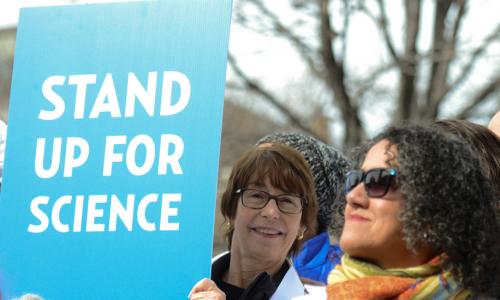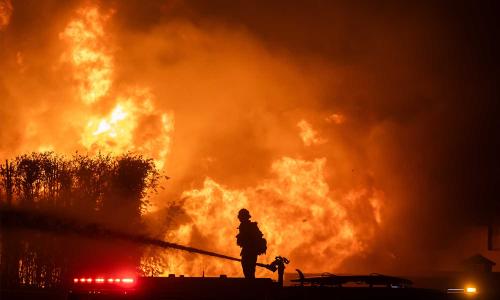Bringing the impacts of climate change home to you and your family.
Climate change has significant implications for our health. Rising temperatures will likely lead to more frequent and severe heat waves, heavier rainstorms and flooding, and increased air pollution. All of these changes could pose serious, and costly, risks to public health.
The Climate Change and Your Health initiative is a UCS effort designed to highlight some of the major health risks associated with climate change in the United States and attempt to quantify their impacts. We also include information to help your family, your community, and our country prepare for—and try to mitigate—the growing health risks of a warming world.
Our Research Series: Climate Change and Your Health
This ongoing series of reports documents how climate change is already affecting our health, discusses potential future impacts, and outlines some concrete steps we can take to protect against the health risks of global warming. Each report features an analysis of a specific climate-related health risk.
Heat in the Heartland: 60 Years of Warming in the Midwest
Rising temperatures are not just a concern for the future. Dangerously hot weather is already occurring more frequently in the Midwest than it did 60 years ago. This has significant implications for public health, especially for urban populations, the elderly, children, and people with impaired health and limited mobility.
This report documents this trend in 10 Midwestern cities, explores its health implications, and looks at what major cities are doing to adapt to these changes and protect their residents. (July 2012)
After the Storm: The Hidden Health Risks of Flooding in a Warming World
Heavy rainfall events that can lead to flooding have been increasing at the same time as temperatures have been rising in the United States. The problem will likely grow worse in the coming years as Earth's atmosphere continues to warm, leaving more and more Americans vulnerable to the immediate and lingering health impacts of flood events.
This report combines a review of flooding health risks with a look at how climate change and current development patterns will likely increase the threat in the years ahead. (March 2012)
Rising Temperatures, Worsening Ozone Pollution
Ozone pollution is directly linked to temperature, thus climate change could likely lead to increased ozone levels. Our analysis found that, within the next ten years, climate change-induced ozone increases in the United States could result in 2.8 million additional respiratory illnesses, 5,100 more infants and seniors hospitalized with serious breathing problems, and 944,000 extra missed school days.
All told, these and other health-related impacts could cost approximately $5.4 billion in 2020 alone. And if global warming pollution continues unabated, the impacts and costs could rise significantly higher. (June 2011)
UCS Workshops, Outreach, and Research
Measuring the Costs of Climate Change to Public Health in the United States
In September 2011, UCS hosted an interdisciplinary workshop examining the costs and impacts of climate change to our health. Leading researchers in public health, climate economics, and climate science came together to discuss ways to better evaluate the health risks of climate change, improve the scope and accuracy of current and projected costs that are quantifiable, strengthen a network of experts working together on these issues, and advance the scientific and policy process of estimating the social costs and impacts of global warming pollution. Read the workshop report (pdf).
Climate Change and Local Departments of Public Health
As the impacts of climate change increasingly affect our health, it is becoming more critical for local public health departments to understand the need for developing programs and practices that help their communities adapt to these changes and minimize the negative impacts on public health. To help address this challenge, UCS recently awarded a Kendall Fellowship for original research in this area.
Are You a Public Health Expert or Medical Professional? You Can Help.
Support the Clean Air Act
UCS convened an open letter to policy makers in support of the Clean Air Act and the EPA. Signed by physicians, registered and advanced-practice nurses, and professionals with advanced degrees in public health, the letter stressed that the EPA is charged with protecting our public health and our environment and that the Clean Air Act is an extraordinarily successful and cost-effective way of doing so. Read the statement and view the list of signers.
Join Our Expert Network
For more than 40 years, UCS has organized and amplified expert voices for sound, science-based policy solutions. To be successful in our efforts to reduce global warming emissions, we need the active participation of health and medical experts like you.
The UCS Science Network includes more than 35,000 scientists, economists, engineers, and health professionals who help support effective policy actions through a range of outreach efforts, including contacting legislators, writing op-eds, and giving media interviews. Join the UCS Science Network today



